Interview: Sergi Mingote on his Earlier Records, Climbing Ethos & Adjourned Expeditions Due to CoViD-19
Dream WanderlustPhotographs: Sergi Mingote
Category: Expedition, Climbing, Interview
Date of Publication: May 13 , 2020
With a deadly pandemic axing off the likelihood for alpinists to return to the mountains, Sergi Mingote, the Spanish alpinist, guesstimates his odds to retrieve his '14*1000 Catalonia Project', to uphold the Winter Olympic candidature in 2030. As his recent Spring calendar (solo ascents on Makalu & Annapurna) was imperiled by the consequences of CoViD-19, he foretells the same fate for his summer attempt on Gasherbrum I.
"Thousands of deaths and a serious economic crisis. We must look forward and be optimistic. It depends on our solidarity with the rest and our discipline to continue fighting together against this pandemic," is what Sergi had to say, during a recent exchange with Dream Wanderlust.
Erstwhile a mayor and a politician in Parets del Vallès for 7 years, for Sergi, it all began with his first snow-biking record at La Molina where he descended at 100.7km/h back in 1995. Since then, climbing five volcanoes in Ecuador in 1997 and bagging his first 8000er (Cho Oyu) in 1998 – Sergi, soon to hit half a century, is in anticipation of breaking Kim Chang-Ho's fastest oxygen-free summits on 8000ers.
"My main goal is to break the record of fastest oxygen-free ascents on all fourteen 8000ers. Current record is made within 7 years, 10 months and 6 days and that is held by the Korean climber Kim Chang-Ho since 2013," said Sergi.
Sergi's ambitious project garnered a worldwide attention in July, 2018, with his record-breaking double-header on Broad Peak and K2 without bottled oxygen in just seven days. Even though back then, his elementary emphasis was on '3x2x8000 Solidarity Project', a year later in 2019, he confirmed his much-ambitious project to climb all fourteen 8000ers in only 1000 days without the aid of bottled oxygen.
During the interview, the 49-year-old Catalan alpinist convened his ideologies on ultra-endurance athleticism, his earlier speed records above 8000ers, and his fresh-new resolutions once he recommences his undertakings on the 8000ers.
"For me, ascending quickly and lightly is essential, and I base that on two clear concepts. The first is a very good resistance training, and speed. I achieve that by doing ultra-resistance competitions both by bicycle, with ultra-running trails or with mountain skiing. The second concept is to choose my technical material very well," he said.
From survival stories in death zone on 8000ers (be it cracking a rib or rescuing fellow climbers on their last legs) to naïvely breaking the record of Boyan Petrov's fastest double-header, Sergi hardly shied away from sharing anecdotes of his 25-year-long career.
Since he climbed the first six 8000ers during his 367-day-long 'Solidarity Project', it was a concrete head-start for his second phase to summit the remaining eight. Amongst them, with Dhaulagiri in last October 3rd, this 49-year-old Catalan alpinist is already half-way to his target in just 444 days.
As part of his week-long acclimatization in Atacama in Chile, he summited four volcanoes, amongst three 6000ers, including Ojos del Salado (6893m), the highest volcano on earth.
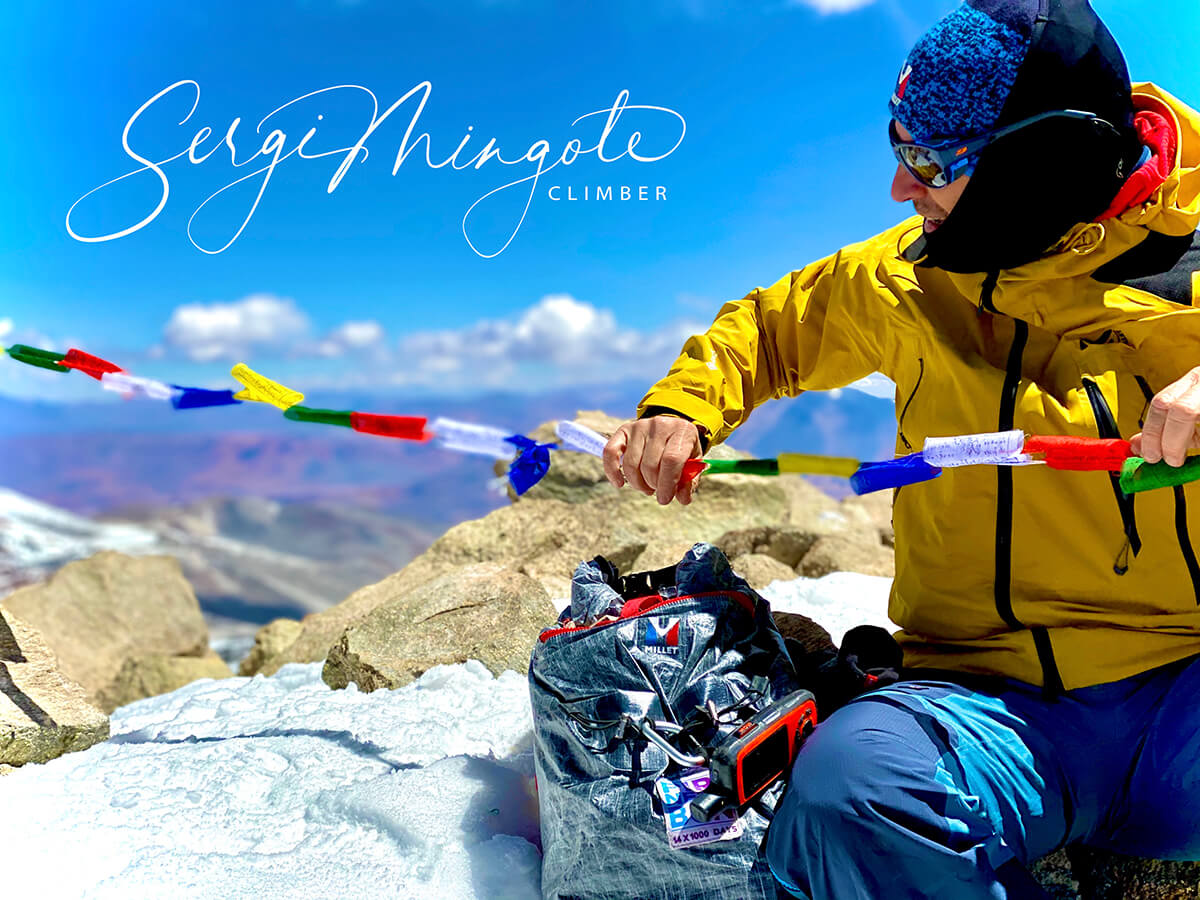
Sergi Mingoge on the summit of Ojos del Salado
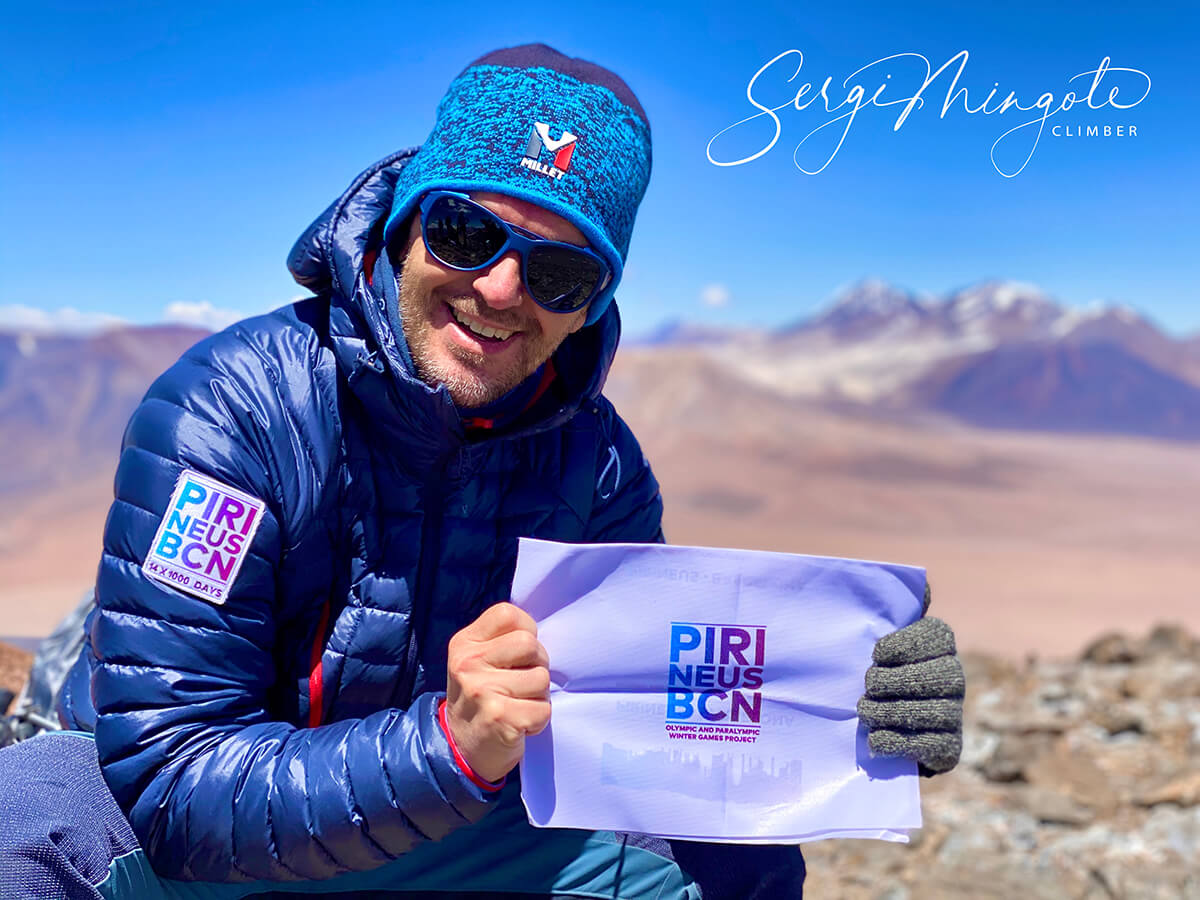
Sergi Mingoge on the summit of Peña Blanca (6034m), Atacama in Chile
Full version of his tête-à-tête with Dream Wanderlust, recorded on 6th May, 2020, is documented down below:
Interview with Sergi Mingote
DW: What is/are the objective(s) of your 'Solidarity Project' and '14X1000 Catalonia Project'?
Sergi: My objective is two-fold – on one hand, to summit all the fourteen 8000m peaks on this planet, without any aid of bottled oxygen in record time, and on the other hand, to promote the Olympic candidacy of PIRINEUS-BARCELONA, for the next winter Olympic Games in 2030.
DW: You already climbed six 8000m peaks in 367 days (including Gasherbrum II, Nanga Parbat, Lhotse, Manaslu, Broad Peak, K2) without supplemental oxygen. What are the other records you want to break, apart from the fastest 8000m ascents?
Sergi: There are currently seven, since last fall I also ascended the Dhaulagiri. Now I'm halfway there. My main goal is to break the record of fastest oxygen-free ascents on all fourteen 8000ers. Current record is made within 7 years, 10 months and 6 days and that is held by the Korean climber Kim Chang-Ho since 2013.
Rest of the other records is complementary but for me, those are not so important. To me, the most important thing is to enjoy and grow internally with each expedition.
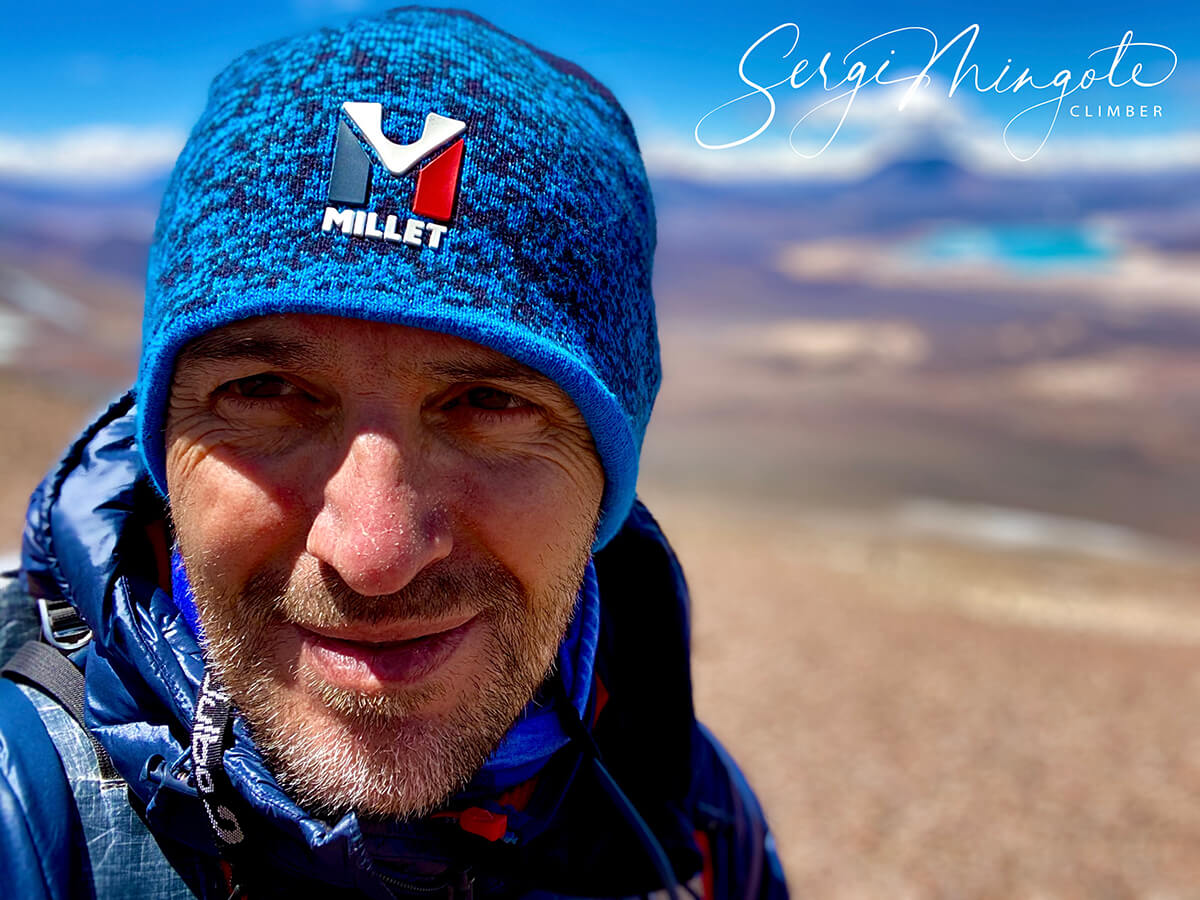
Sergi Mingoge
DW: Your country has been seriously affected by the CoViD-19 pandemic. How does that affect your activities as a full-time mountaineer?
Sergi: Especially, it affected in the calendar of this spring, since I had to suspend my expeditions to Annapurna and Makalu. Perhaps, it also affects the summer to Gasherbrum I. But that is not the most important thing. What is seriously severe is the situation we are experiencing on our planet. Thousands of deaths and a serious economic crisis. That will bring a lot of damage for a long time. We must look forward and be optimistic. We will get out of this situation, and we will make it stronger.
DW: Do you foresee any chance to climb at all on any 8000m peak this year? In your opinion, how would this pandemic affect the mountaineering community?
Sergi: I hope and wish if I could try some more 8000ers this coming fall, but without a doubt, this serious health crisis will affect all groups and the mountain community as well.
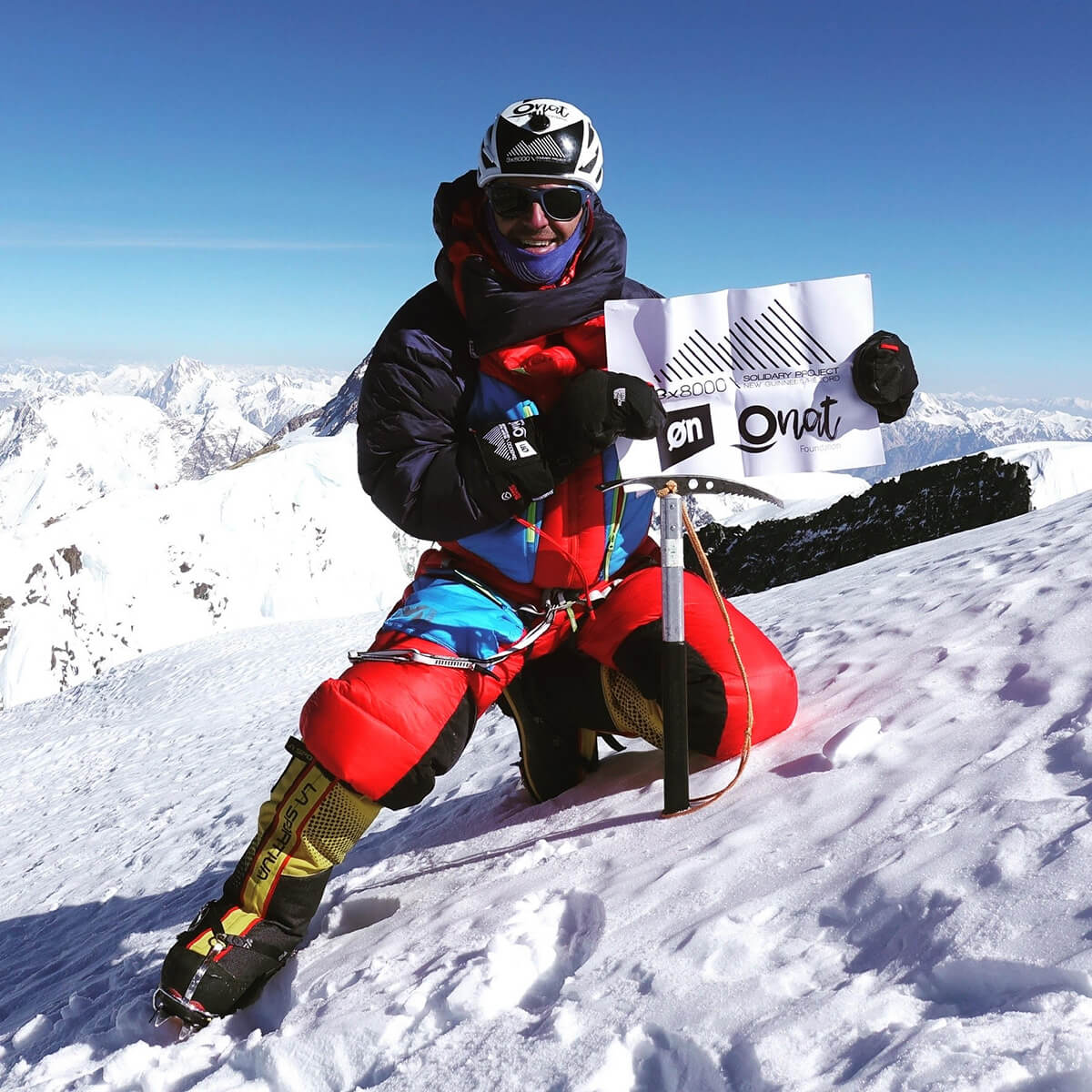
Broad Peak summit on 16th July, 2018
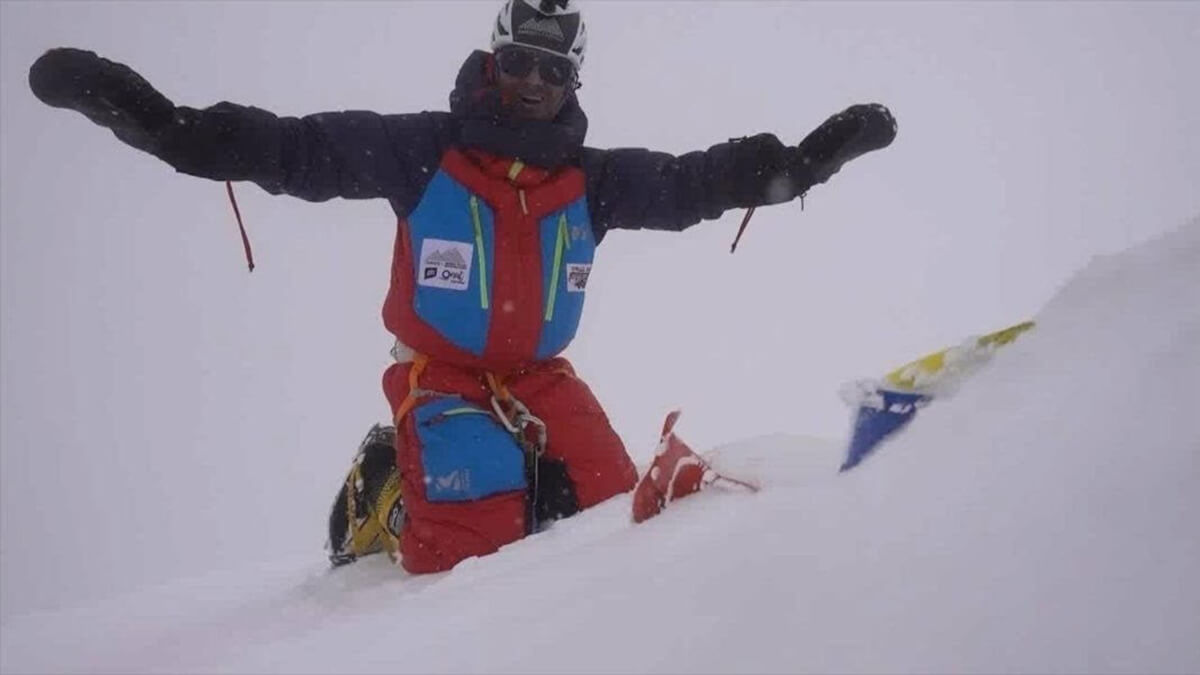
K2 summit on 23rd July, 2018
DW: You made the fastest oxygen-free double header on K2 and Broad Peak in 7 days in July 2018, breaking Boyan Petrov's record of 8 days in 2014. What inspired you?
Sergi: It was an incredible start to the project. There I had survived one of the hardest circumstances of my life. On K2, it was not clear whether I could go down alive. It was a really extreme situation.
Honestly, neither did I know about his record, nor my intention was to break it, it was a consequence of my approach. Inspiration always comes from my motivation to fulfill my dreams.
DW: In July 2019, you reached the top of Nanga Parbat and Gasherbrum II without oxygen in just 15 days, having climbed Lhotse in May 2019. Do consecutive expeditions at 8000m peaks make the next climb easier or physically more difficult?
Sergi: Everything becomes more difficult, since without using oxygen, recoveries are slower and exhaustion accumulates faster. I noticed a lot of fatigue in my last 8000er, but that is part of my project as demanding as this one. The only advantage is that acclimatization is maintained more consistently throughout the year, and blood oxygen levels as well.
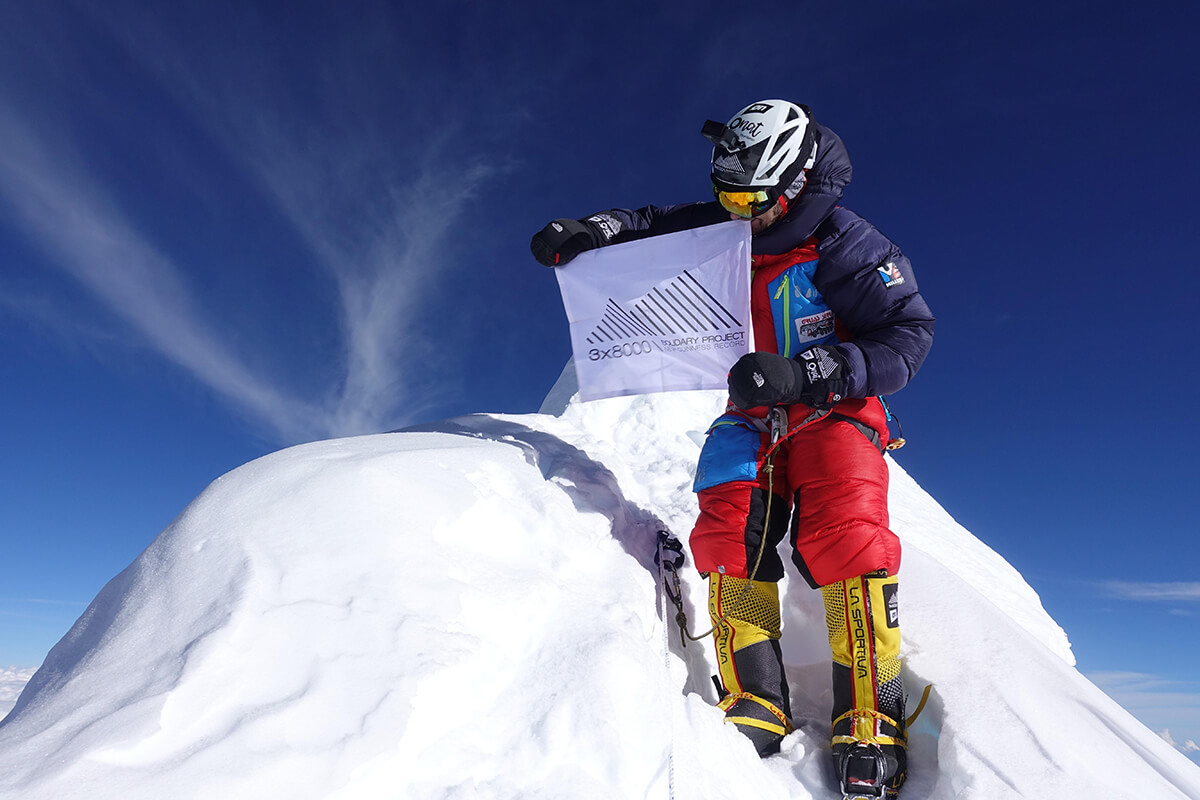
Manaslu summit on 25th September, 2018
DW: You have advocated ultra-endurance athletics in the mountains. How do you train for your 8000m expeditions?
Sergi: For me, ascending quickly and lightly is essential, and I base that on two clear concepts. The first is a very good resistance training, and speed, and I achieve that by doing ultra-resistance competitions both by bicycle, with ultra-running trails or with mountain skiing.
The second concept is to choose my technical material very well, and that for me is easier being an ambassador for brands like MILLET, JULBO or VILADOMAT. In my last expedition to the Dhaulagiri, I tried to minimize the weight of my material even more, and managed to reduce it by almost two kilos. That gives me the chance to ascend much faster and wasting less energy.
DW: Last spring, your initial plan was to climb Lhotse and Everest, one after the other, followed by Kanchenjunga, all without bottled oxygen. What went wrong on Everest after you came down from Lhotse?
Sergi: The experience at Lhotse was really hard. During the ascent, a stone fell on my chest and it cracked a rib, but what was really serious was the loss of Ivan Tomov, a Bulgarian mountaineer who also reached the summit without using bottled oxygen. While descending, he suffered a cerebral edema. Although we did everything in efforts to recover his health back to normal, it was not possible.
When that happened I decided to go home. My attention was not at 100% to approach another new 8000er.
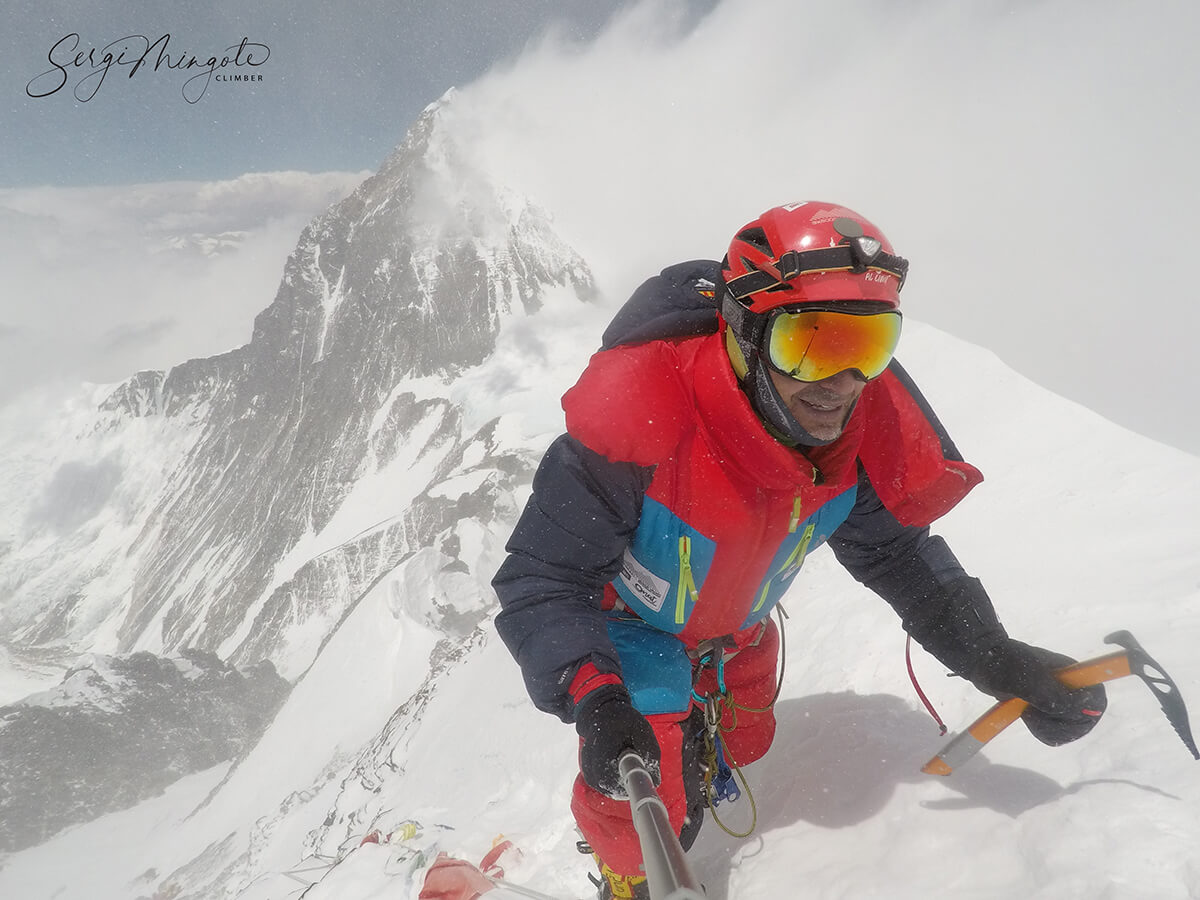
Sergi Mingote on the summit of Lhotse
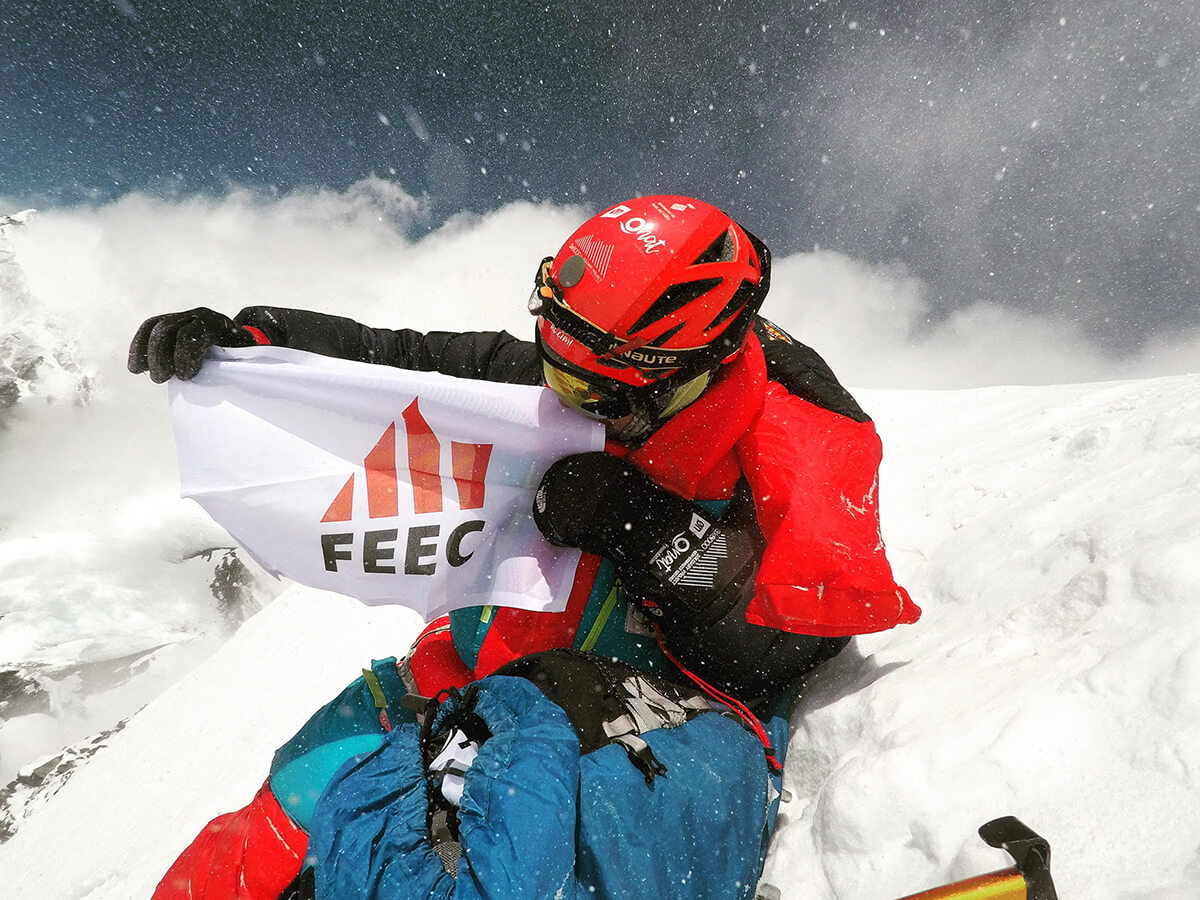
Lhotse summit on 16th May, 2019
DW: In 2018, you climbed Manaslu oxygen-free in just 10 days within your arrival at the base camp. Does your experience of climbing in the Himalayas for 25 years help you acclimatize faster?
Sergi: Experience always helps many things, including making the best decisions, knowing when to ascend or descend, controlling rhythms, and above all - knowing the conditions of the mountain and your own body.
For better acclimatization, you have to work on each expedition, and that means being as long as possible at height during the year.
DW: In 2018, you climbed Broad Peak, K2 and Manaslu in 70 days. Then in 2019, you made Lhotse, Nanga Parbat and Gasherbrum II in 63 days. How do you rationalize this approach when it is recklessly fast?
Sergi: I never counted the 63 days in the last three 8000er, it's good to know, thanks!
In no case, I would ever try to rationalize my projects, since honestly my project is very passionate. What I do is plan and work very hard to get stronger physically and mentally.
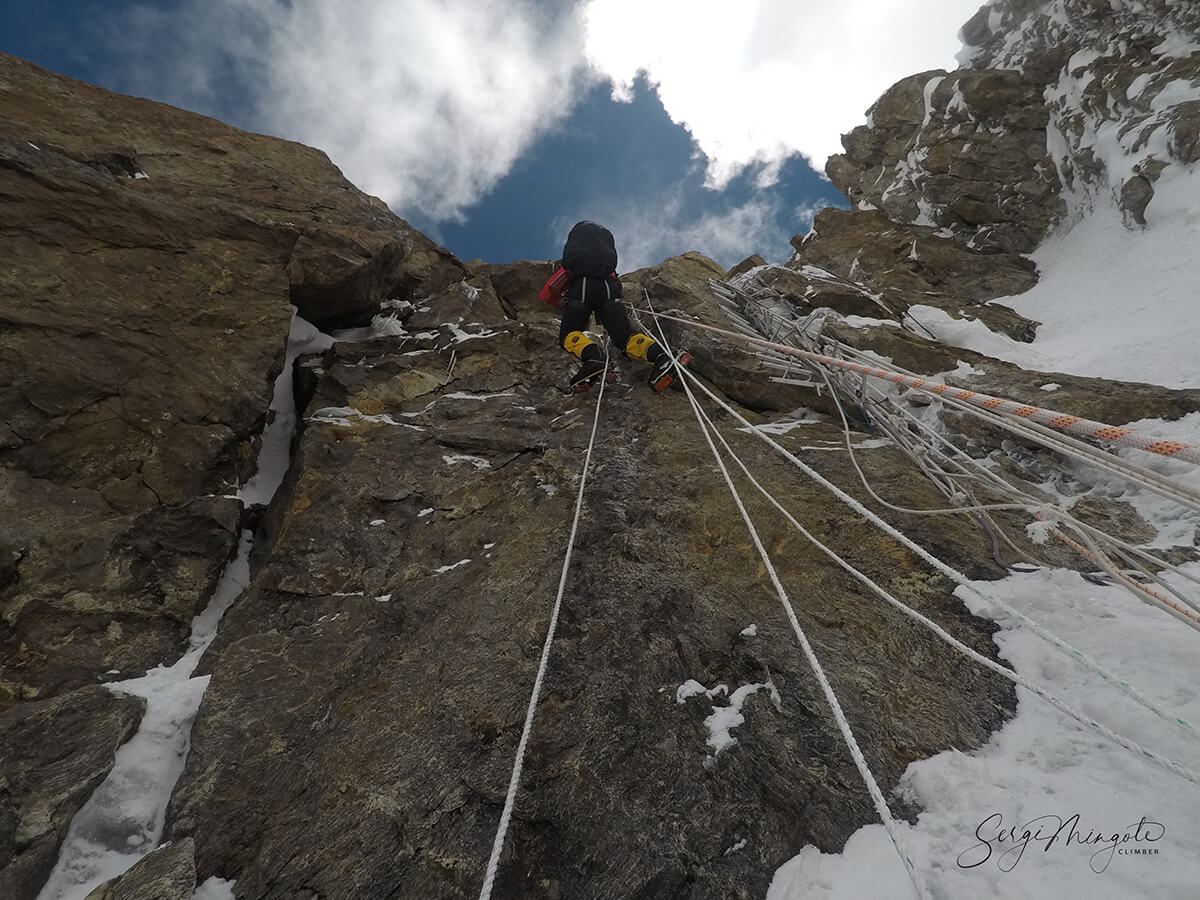
Sergi Mingoge climbing the Kinshofer route on Nanga Parbat
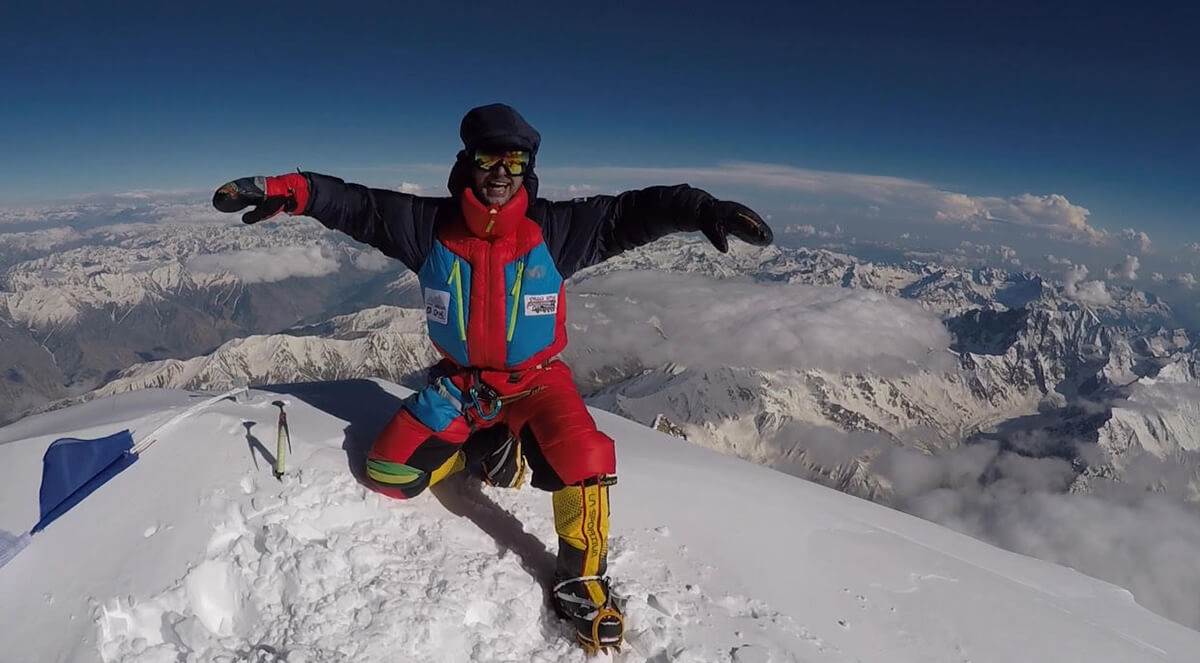
Nanga Parbat summit on 3rd July, 2019
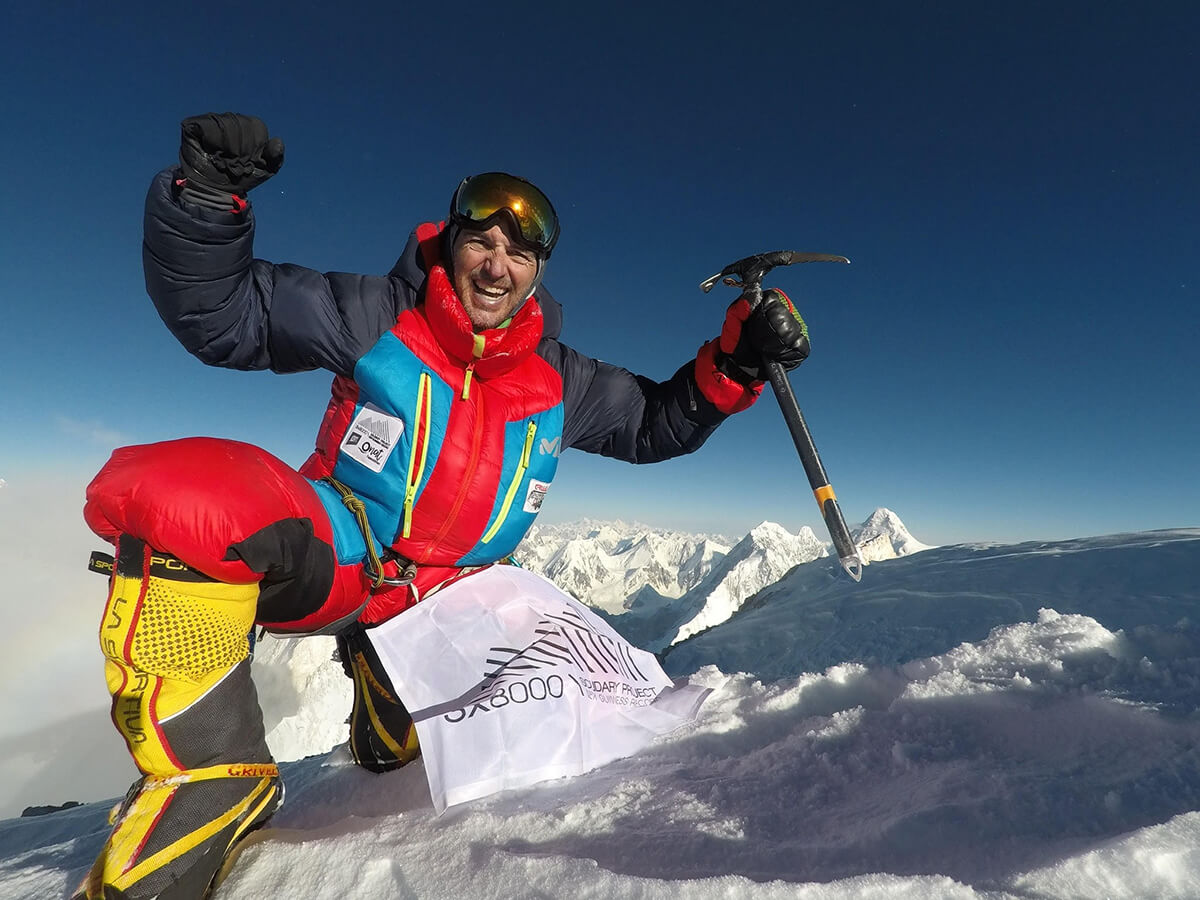
Gasherbrum II summit on 18th July, 2019
DW: In 2018, you opened two routes at 8000m peaks. You first went to Broad Peak in Karakorams in July, fixing the rope from Camp-2 onwards. The second was in Manaslu in the Himalayas in September, with the Sherpas. Would you rather enjoy the freedom of climbing alone than in a team?
Sergi: In 2018 at Broad Peak, I participated in the first route-opening ascent of the season, together with my colleagues from Funterbach, and the Sherpas of his group were the ones who worked the most that day opening the route. I like to be fair and honest always, and they were the true heroes of the day.
During the Manaslu ascent, it was also another joint effort, but much harder, since we reached the summit at 4 in the afternoon. There have been more first summits of the season, such as on Dhaulagiri or Nanga Parbat, where we climbed without fixed ropes from the Camp-4 to the summit.
I always enjoy more of my climbs with friends and colleagues, but it is not always possible.
DW: What motivates you to break the record of climbing all fourteen 8000m peaks in least time without oxygen and no Sherpa?
Sergi: The motivation comes from the desire to achieve my dreams. If you can dream it, you can do it. We must think that the key to success lies in 80% of insisting on your goals, and to be persistent, you have to keep yourself motivated. It is not enough just to think about it.
Before starting the "14x1000 Project", I asked myself whether I was willing to do everything necessary to achieve it.
DW: As a mountaineer, how do you look back at your achievements so far?
Sergi: I remember them with hope and only hope. The hope of knowing that in a short time we will return to share exciting moments in the highest mountains on the plane again. It depends on our solidarity with the rest and our discipline to continue fighting together against this pandemic.
DW: Thank you so much for the interview. Stay safe in between this pandemic.
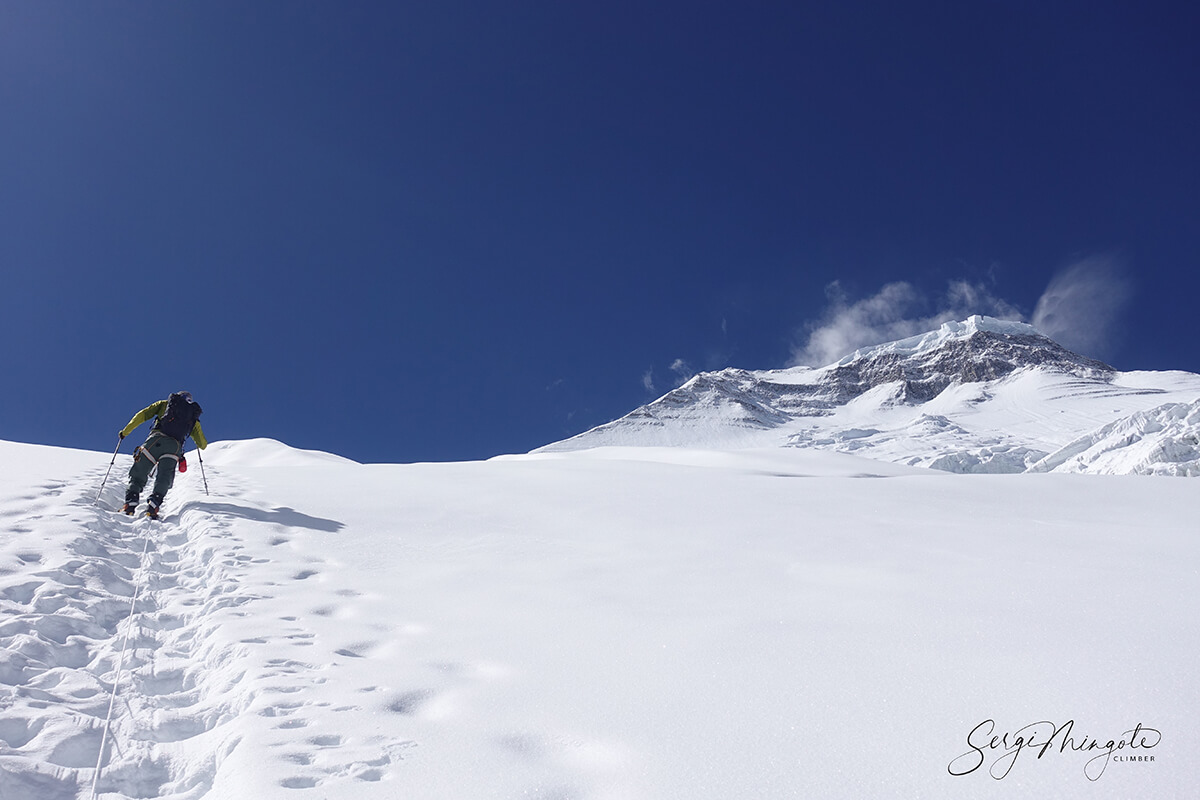
Sergi Mingoge on his Dhaulagiri expedition
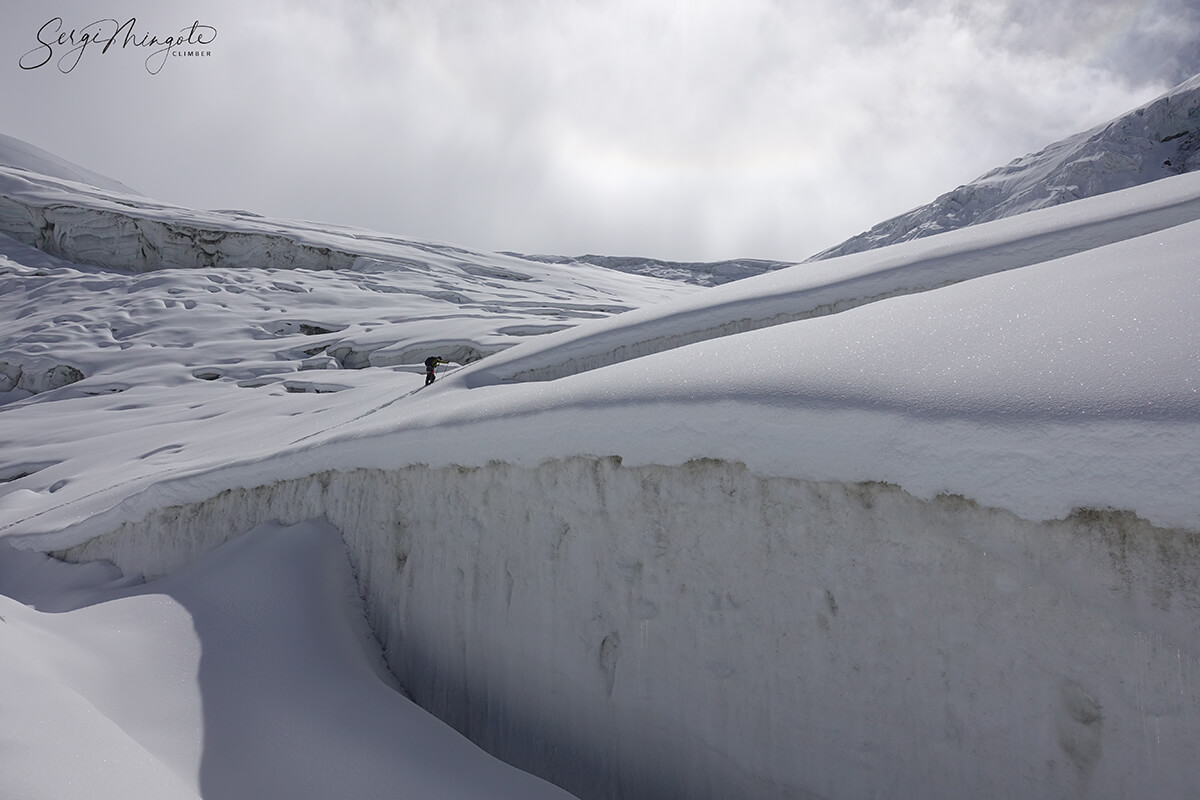
Sergi Mingote climbing Dhaulagiri
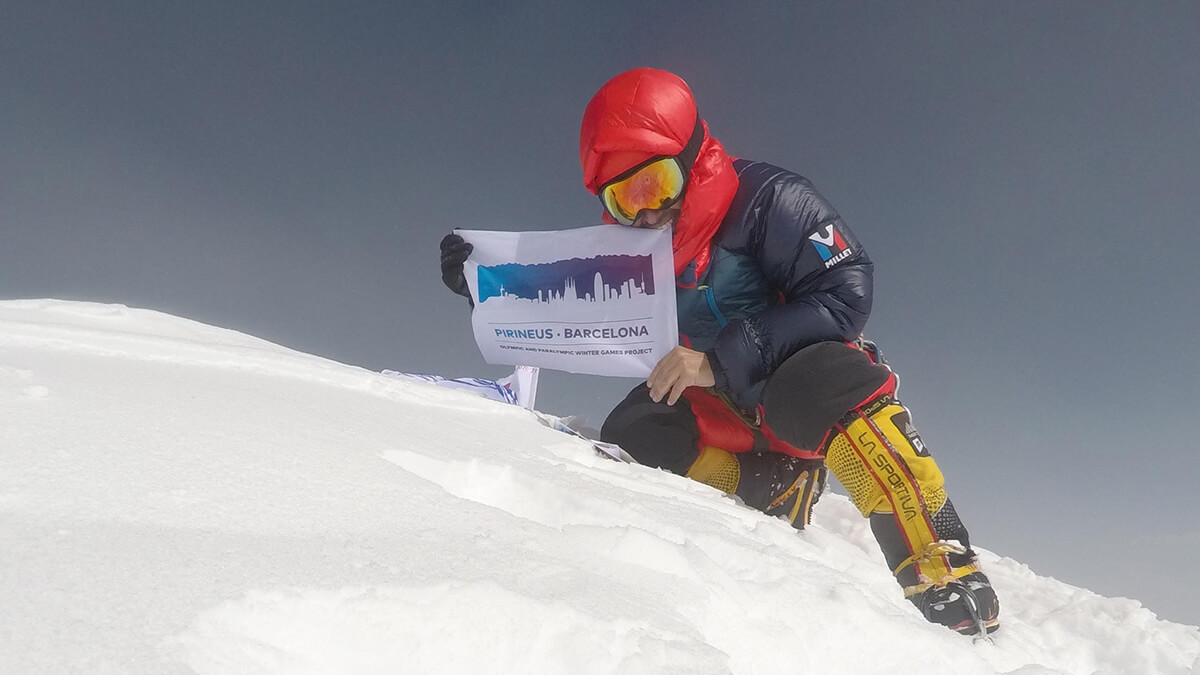
Dhaulagiri summit on 3rd October, 2019
Related Articles
Place your ad here. Call +919163231788 or Contact Us









